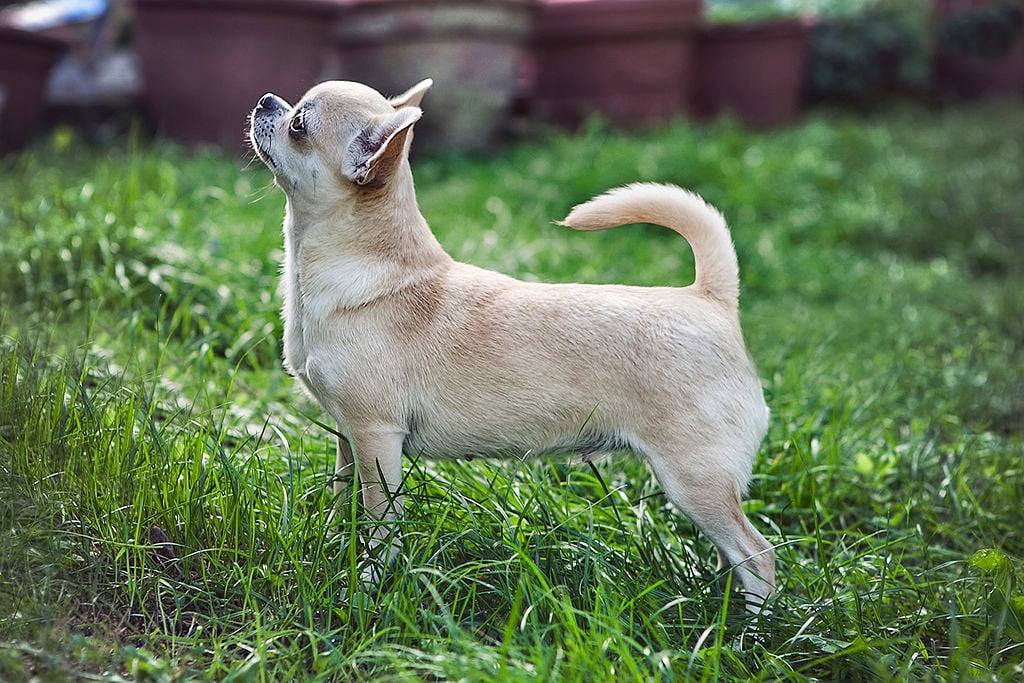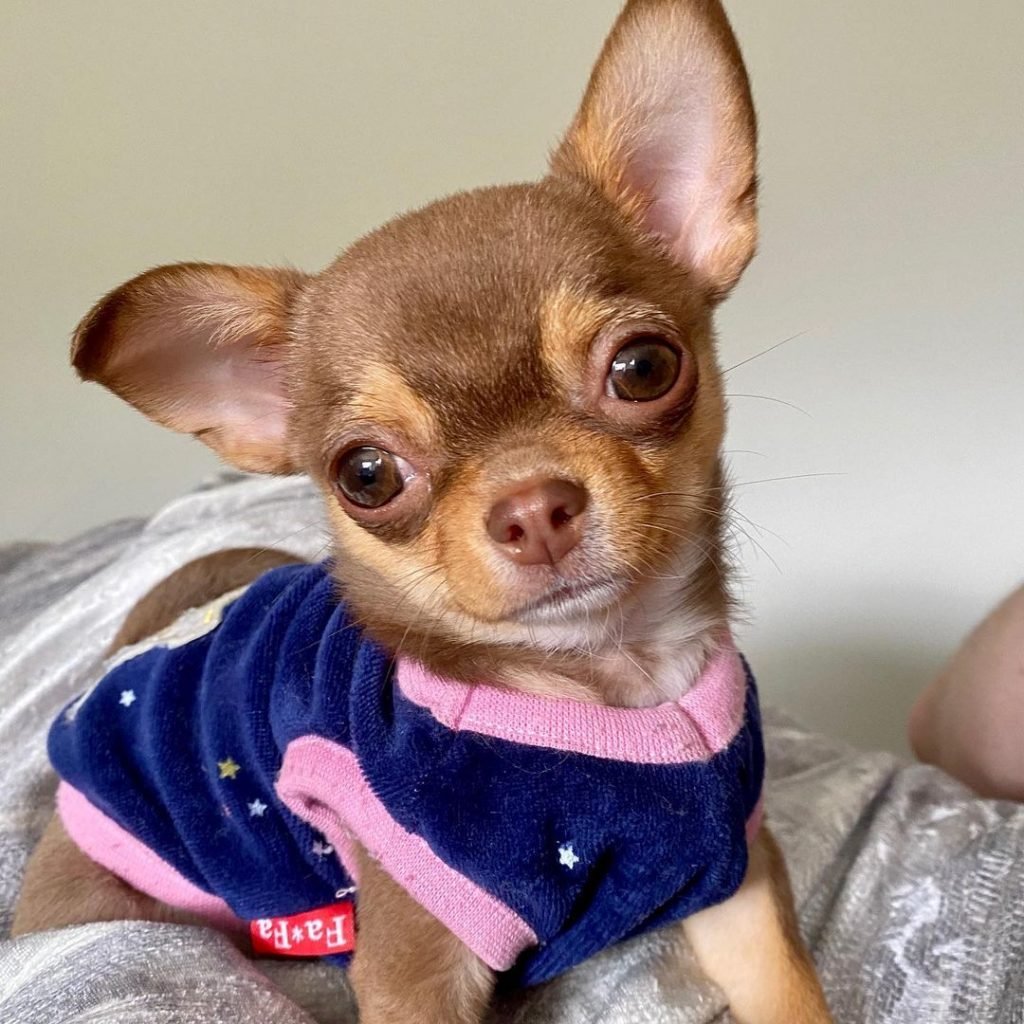
Small, full of personality, looks great in a sweater…yes, we’re talking about Chihuahuas. This popular companion dog is loyal (sometimes fiercely), playful, and famously adorable. And, as is the case with other little dogs, you’ll be hard-pressed to find a Chihuahua who doesn’t know how to amp up the cuteness to get what they want.
Learn more about Chihuahua dogs in this in-depth breed profile, and let us help you decide whether a Chihuahua is the right kind of dog for you.
Breed Characteristics
Key
- Low
- Medium
- High
- Origin: Mexico
- Size:
- Weight: <10 pounds
- Activity level:
- Barking/howling level:
- Good with dogs: yes
- Good with kids: yes
- Good with cats:
- Shedding:
- Grooming level:
- Training level:
Chihuahua Appearance

Chihuahuas have a distinctive look: small body, pointed ears, big expressive eyes. Most people are familiar with the short-haired Chihuahua, with a smooth coat that looks like it can’t possibly keep the dog warm. However, there are also long-haired Chihuahuas. Still, all Chihuahua dogs need a little extra warmth in cold weather (that’s why all those cute sweaters were invented).
Among long-haired and short-haired Chihuahuas, there are two distinct Chihuahua body types: apple head and deer head. The apple head variety of Chihuahua is shorter, with a round head and eyes set close. The deer head Chihuahua is taller, with a flat-topped head and eyes set wide.
Ever heard of a hairless Chihuahua? Although they may look similar to a Chihuahua, these dogs are a different breed, known as the Xoloitzcuintli.
You may have also heard of toy and teacup varieties of Chihuahua. These are not officially recognized breeds, but rather smaller dogs of the same breed. Weighing in at under five pounds, teacup Chihuahuas are the tiniest ever. It’s not a good idea to work with so-called teacup breeders, as these extra-tiny dogs often suffer from health concerns due to their unnatural size.
Chihuahuas have an extremely wide range of colorings, including white, black, brown, chocolate, brown, fawn, red, cream, and mixed. They can also have a special form of coloring called merle, which is a mottling of the base coloring with lighter splotches.
As far as grooming goes, Chihuahuas are relatively easy to maintain. Weekly brushing for short-haired Chihuahuas (more for long-haired varieties), and a once a month bath should be enough. Nails should be trimmed every few months. To clean eye discharge, use a warm, wet washcloth.

Ideal Environment for a Chihuahua
A Chihuahua might seem like a lap dog (and will spend plenty of time cuddling), but they also need regular exercise. That means daily walks and playtime.
Because of their small size and temperament, Chihuahuas also need a calm home environment, preferably without small children, who are more likely to make the dog anxious or hurt the dog on accident.
Despite their specific needs, Chihuahuas are very adaptable and make good pets in even small city apartments. Bundle them up for the cold weather, and they’ll be happy almost anywhere.
Ideal Human for a Chihuahua
The best Chihuahua owner will have plenty of time for their pet, on many levels. Pet parents will have to spend extra time on training and socialization. Chihuahuas also don’t like to be left alone—being left alone, combined with lack of exercise and play, will exacerbate any underlying aggressive or anxious behavior.
If you do need to leave the house for shorter periods of time, consider crating your pet. The ideal Chihuahua parent will probably work part-time, or from home, so that they can spend maximum time caring for and bonding with their pet. That said, enlisting the help of a trusted pet sitter or daycare provider can be a lifesaver. In-home daycare is best for Chihuahuas given their small size.
Chihuahua Training
With a spunky, intelligent dog like a Chihuahua, positive reinforcement is best (no scolding), and they’ll need frequent consistent obedience training. Some say it’s better to suggest that a Chihuahua do something than to demand it, and while Chihuahuas enjoy being rewarded with treats and praise, they’ll want variety, and only have the patience for short training sessions. To get ahead of the game, try training them on an empty stomach, and accept that it’s going to be time-consuming, but worth it in the long run.
For the reasons we’ve already mentioned, house-training Chihuahuas is notoriously difficult. Chihuahuas are small and sneaky, and unless you’re really vigilant, you’ll probably find them toileting in secret places.
To prevent the carpet from becoming a favorite pee spot, use a crate or gates to keep the dog out of the no-go areas, and take frequent trips outside to potty. Be sure to use plenty of treats and praise when they go where you want them to!

Chihuahua Grooming
Your chihuahua’s grooming needs will vary depending on whether they have long hair or short hair. In general, occasional baths are enough to keep chihuahuas clean. As for brushing, short-haired chihuahuas only need occasional brushing to keep their coat healthy. Long-haired chihuahuas need brushing at least once per week to avoid tangles, and their fur should be detangled completely before bathing. Both types of chihuahuas should have their teeth brushed and nails trimmed regularly. In addition, the AKC recommends checking chihuahuas’ ears regularly and removing excess wax.
Chihuahua Health
Like other small dogs, chihuahuas are more prone to specific health problems related to their size. Chihuahuas will need more dental care than other dogs. Daily brushing, dental chews, and the right dog food will help. Chihuahuas are also predisposed to tracheal collapse. Invest in a good harness that will safely fit your Chihuahua and take the pressure off the neck area.
Chihuahuas are also predisposed to other health conditions, including hypoglycemia (low blood sugar), eye infection, luxating patella (when the kneecap tends to move out of its normal position), and (more rarely) hydrocephalus and heart conditions. Many pet parents opt for pet health insurance, just in case.
Chihuahua History
The Chihuahua dog is originally from Mexico and named after the Mexican state of Chihuahua. The first Chihuahuas were officially recognized in the United States by the American Kennel Club (AKC) in 1904, but Chihuahua history runs deep. This dog is thought to descend from the Techichi, an ancient companion dog from the Toltec civilization (as early as the 9th century), but dog toys from as early as 100 AD have been found depicting Chihuahua-like dogs.
Getting a Chihuahua
Getting a Chihuahua is simple, but it’s important to be prepared. If you’re adding a Chihuahua puppy to your life, you’ll want to spend plenty of time teaching basic obedience, socializing the puppy to other people and dogs, and teaching important skills like sleeping through the night and going to the bathroom outside.
Finding a Chihuahua puppy or adult dog can be as easy as an internet search, but be careful of puppy mills and internet scams. There are many ways to find a reputable breeder, and it’s good to ask around, visit before committing to payment, and trust your gut.
Cost of a Chihuahua
Pet parents ready to welcome a chihuahua into their family should be aware of all the costs involved. In fact, according to Rover’s Cost of Pet Parenthood Survey, 33% of pet parents with a Chihuahua claim they expected to spend $250-$500 on upfront costs for their dog. But, 42% said the actual upfront costs matched their budget and 40% said the actual costs were higher. Overall, 82% of pet parents spend less than $100 per month on their Chihuahua.
Chihuahua Rescues
Another way to find a Chihuahua is to adopt a rescue—61% of owners got their Chihuahua through adoption from a shelter or rescue. Unlike puppies, rescues often come spayed and neutered, and with all their shots. Many Chihuahua rescues are surrendered by individual owners, and these dogs are likely to know basic commands and be socialized. If not, that doesn’t mean you can’t work with them. Contact a trusted dog trainer for more information on how to teach a dog who hasn’t experienced much structure, or how to help a dog who has been traumatized to feel safe and welcome.
Chihuahua Breeders
To find breeders who have to meet stringent requirements, use the AKC search tool to find a reputable Chihuahua breeder near you. When you visit, be sure to ask about any health issues in the dog’s bloodline, and discuss any genetic tests you might want to run.
More on Chihuahuas
Feel chic with more chihuahua goodness in your life–we’ve got plenty more for you to explore in the world of this popular little Mexican dog:
- 16 Gift Ideas for Your Favorite Chihuahua Lover
- Top 5 Toys for Chihuahuas
- 5 Best Harnesses for Chihuahuas
- Top 4 Leashes for Chihuahuas
- 5 Best Dog Beds for Chihuahuas
- Other Rover Reviews
- 10 Best Clothes and Accessories for Chihuahuas
- Chihuahua Puppies: Everything You Need to Know
- The 115 Most Popular Chihuahua Names
- The Best Dog Food for Chihuahuas
